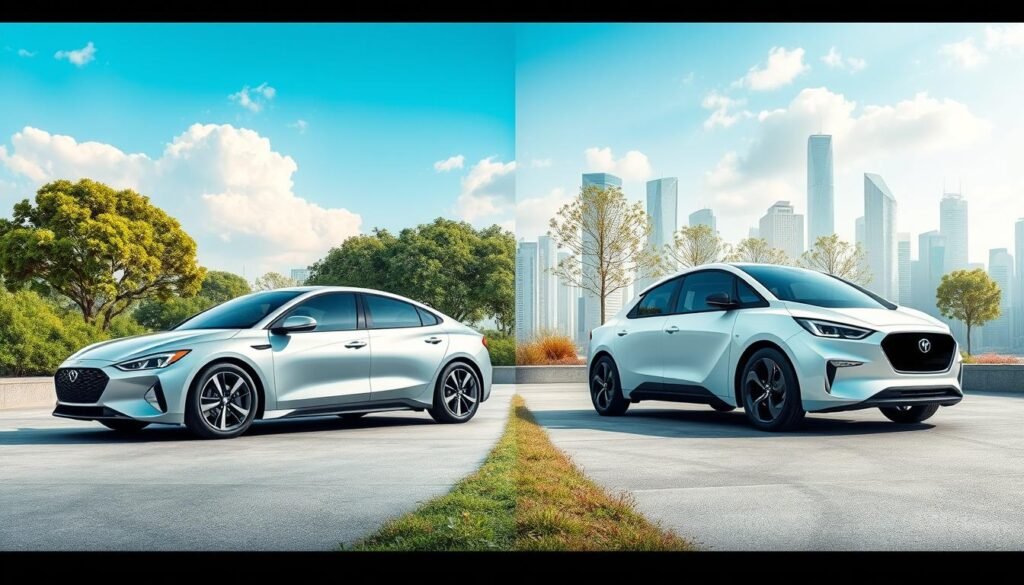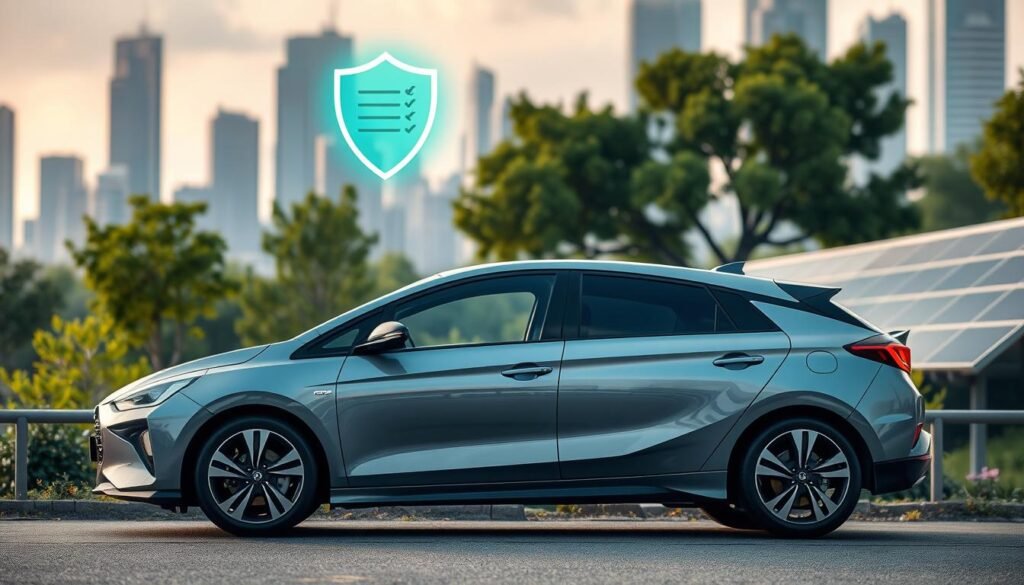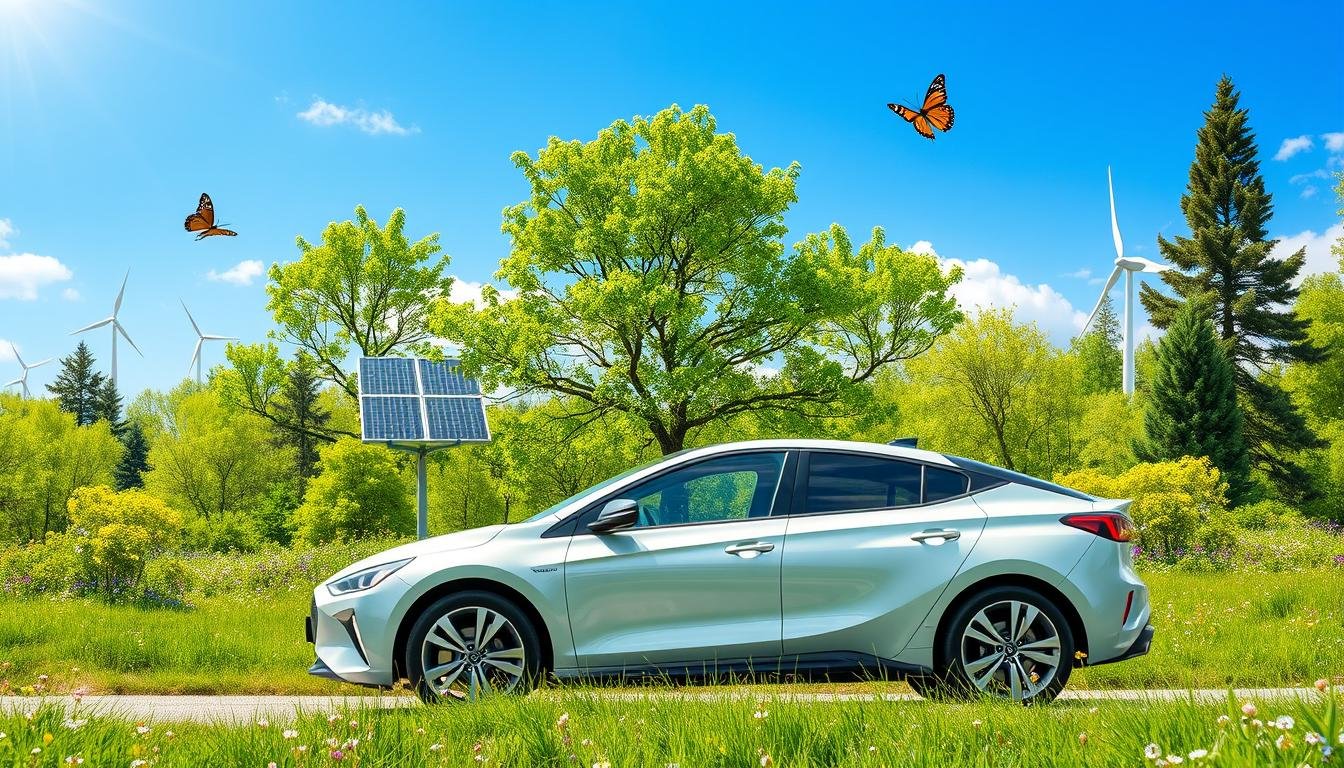Did you know that hybrid cars can reduce greenhouse gas emissions by up to 60% compared to traditional gasoline-powered vehicles? This remarkable reduction is due to their unique combination of gasoline engines and electric motors. Hybrid cars are at the forefront of the transition to eco-friendly driving and environmentally friendly vehicles. They offer an excellent solution for those aiming to minimize their carbon footprint while enjoying a superior driving experience.
Key Takeaways
- Hybrid cars significantly lower emissions compared to conventional vehicles.
- They enhance fuel efficiency, contributing to cost savings on gas.
- Hybrid vehicles often qualify for government incentives and tax benefits.
- These eco-friendly options are increasingly becoming popular in Canada.
- Hybrid technology bridges the gap between gasoline and electric cars.
- Driving a hybrid can lead to a smoother and quieter ride.
What is a Hybrid Car?
Grasping the hybrid vehicle definition is crucial for those eyeing eco-friendly transportation options. Hybrid cars merge an internal combustion engine with electric motors, boosting fuel efficiency and cutting emissions. This design innovation plays a pivotal role in environmental stewardship.
Definition of Hybrid Vehicles
Hybrid vehicles are distinguished by their dual power sources: traditional fuel and electric power. This hybrid technology enables vehicles to transition smoothly between power sources. Consequently, drivers benefit from a superior driving experience while significantly reducing their environmental impact. The synergy between these systems optimizes energy consumption, a critical factor in modern automotive engineering.
Types of Hybrid Cars
Hybrid cars come in various forms, each with unique attributes and operational modes:
- Conventional hybrids: These vehicles combine gasoline engines with electric motors. The electric component mainly aids in fuel savings, not in sole propulsion.
- Plug-in hybrids: This category allows for battery charging from an external source, extending electric driving capabilities. It also retains a gasoline engine for longer journeys.
- Mild hybrids: These models use electric motors to assist the gasoline engine but cannot operate solely on electric power.
As the market expands, recognizing these distinctions aids in making better choices. For further insights, reliable resources on hybrid technology and vehicles are available.
Environmental Benefits of Hybrid Cars
Hybrid cars offer a significant opportunity for those seeking to enhance environmental sustainability. These vehicles are designed to emit fewer pollutants than traditional gas-powered cars, thereby improving air quality. Their dual power systems enable drivers to harness cleaner energy while retaining the convenience of gasoline.
Lower Emissions and Air Quality Improvement
The primary benefit of hybrid vehicles is their ability to minimize harmful emissions. By integrating an electric motor with a gasoline engine, they achieve greater efficiency and lower pollution levels. This results in a substantial decrease in airborne toxins, enhancing air quality in both urban and rural settings. Communities benefit from the reduced environmental impact brought about by hybrid cars.
Reduction in Fossil Fuel Dependency
Hybrid cars also contribute to reducing our reliance on fossil fuels. They operate on electric power for shorter distances, leveraging cleaner energy sources. This shift promotes a more balanced fuel usage, supporting energy diversity and environmental conservation efforts. Adopting hybrid technology allows consumers to participate in a larger movement towards sustainable transportation.
Economic Advantages of Driving Hybrid Cars
Hybrid cars present significant economic benefits, positioning them as a wise choice for many drivers. Their fuel efficiency leads to substantial cost savings over time. Utilizing advanced technology, these vehicles consume less gasoline than traditional cars, thus reducing fuel expenses.
Fuel Efficiency and Cost Savings
The impressive fuel efficiency of hybrid cars is a notable advantage. This efficiency results in lower fuel costs, leading to long-term savings. Hybrid vehicles achieve higher mileage per gallon, reducing the need for frequent gas station visits. This not only benefits the wallet but also aids in reducing greenhouse gas emissions, enhancing their appeal.
Government Incentives and Tax Benefits
Governments worldwide, including Canada, acknowledge the value of eco-friendly vehicles. They offer incentives such as rebates and hybrid car tax credits to encourage their adoption. These programs make hybrid ownership more financially viable. For a detailed look at hybrid benefits and considerations, refer to an informative resource on hybrid pros and cons.
Moreover, many Canadian provinces provide additional assistance through provincial rebates. Leveraging these government incentives can significantly lower the initial cost of a hybrid vehicle. This makes hybrids an appealing option for those on a budget.
The economic benefits of hybrid cars create a compelling value proposition. Cost-conscious drivers can enjoy enhanced financial benefits while contributing to a cleaner environment. This makes hybrid vehicles an excellent choice for forward-thinking consumers.
Performance and Driving Experience
Hybrid vehicles merge performance with comfort, appealing to drivers seeking a smooth ride. Their quiet operation creates a serene travel atmosphere. The transition between electric and gas power ensures efficient power delivery, enhancing the driving experience.
Smooth Driving and Quiet Operation
The performance of hybrid cars is marked by their quiet and vibration-free ride. Drivers find them ideal for city commuting due to their smooth glide. Low noise levels make the journey more enjoyable, allowing for conversations or simply enjoying the surroundings.
Acceleration and Power Comparison
An acceleration comparison between hybrids and traditional vehicles reveals hybrids’ urban prowess. They excel in city driving, where immediate torque is crucial. The electric motor adds a power boost, enabling quicker starts and smoother acceleration. Many hybrids match gasoline cars in handling and responsiveness.
Exploring financing options can improve the buying experience. Financing support allows drivers to enjoy hybrid benefits without compromising on performance or comfort.
Reliability and Maintenance of Hybrid Vehicles
The intricate workings of hybrid cars showcase an impressive level of hybrid car reliability. These vehicles are equipped with advanced technologies that significantly enhance the durability of their components. This results in a remarkable longevity of hybrid systems, making them a popular choice for drivers who prioritize both performance and efficiency.
Longevity of Hybrid Systems
Hybrid systems offer several advantages that contribute to their longevity. Key factors include:
- Fewer moving parts compared to traditional engines
- Efficient energy management systems
- Less strain on the engine due to the electric motor assistance
This innovative design not only ensures prolonged vehicle life but also translates into less frequent repairs and improved reliability over time.
Maintenance Costs vs. Traditional Cars
When it comes to maintenance costs, hybrid vehicles often outshine their gasoline counterparts. Drivers can expect:
- Lower costs for routine maintenance
- Reduced wear on the braking system, leading to fewer replacements
- Better fuel economy, which indirectly decreases maintenance frequency
While regular vehicle upkeep remains essential, many owners find that their total expenses are lower when driving a hybrid. This is due to the innovative engineering that supports hybrid car reliability and overall system efficiency.
The Future of Hybrid Cars

The automotive industry is witnessing a transformative era, with hybrid cars at the forefront. Environmental concerns drive innovation, reshaping vehicle design and operation. These advancements boost efficiency and meet the escalating demand for eco-friendly transportation.
Innovations in Hybrid Technology
Recent breakthroughs in hybrid technology are significant. Manufacturers are concentrating on:
- Enhanced battery systems for longer driving ranges.
- Advanced regenerative braking to optimize energy capture.
- Efficient charging infrastructure for quick refueling.
These innovations in hybrid technology are crucial for wider acceptance. Companies like Toyota and Honda are spearheading the transition to a greener automotive landscape.
Market Trends in Canada
In Canada, market trends are undergoing a notable transformation. Hybrid vehicle sales are increasing due to:
- Growing environmental consciousness among consumers.
- Government initiatives supporting cleaner energy vehicles.
- A wider range of hybrid models to suit various tastes.
The outlook for hybrid cars in Canada is promising. For a deeper dive into this trend, explore why hybrid cars are crucial.
Hybrid Cars and Resale Value
The resale value of hybrid cars is a critical factor for potential buyers. These vehicles generally hold their value better than traditional gasoline cars. This is due to their growing demand and the numerous benefits they offer.
Comparison of Resale Values
When comparing resale values, hybrids often outperform conventional vehicles. Brands such as Toyota and Honda are renowned for their hybrids that retain competitive prices over time. This durability appeals to buyers looking to make a smart investment.
Factors Impacting Resale
Several factors impacting resale values contribute to the appeal of hybrid cars. Key elements include:
- Brand reputation and reliability, which influences buyer trust.
- Model popularity and demand, driving prices upward.
- The vehicle’s overall condition, including maintenance history and mileage.
Understanding these components clarifies why the hybrid car resale value remains remarkably appealing within the automotive market.
The Role of Hybrid Cars in Climate Change
Hybrid cars are transforming the automotive sector, particularly in the fight against climate change. Their design enables lower emissions, aligning with government emissions reduction goals. This innovation is crucial in promoting a shift towards sustainable transportation practices.
Emissions Reduction Goals
As nations face the pollution consequences, hybrid vehicles emerge as a viable solution. They produce fewer greenhouse gases than traditional gasoline cars. This decrease aids in meeting emissions reduction goals and supports a healthier environment. Governments have acknowledged the importance of hybrid technologies in transportation, offering various incentives to encourage their use.
Contribution to Sustainable Transportation
Hybrid cars are a key step towards sustainable transportation. By merging electric motors with internal combustion engines, they enhance fuel efficiency and reduce fuel consumption. The positive climate change impact is clear in urban areas, where air quality improves and fossil fuel reliance decreases.
Adopting hybrid technology not only meets current environmental standards but also prepares for future challenges. Supporting hybrid cars brings society closer to a sustainable future with lower carbon footprints.
Hybrid Cars vs. Electric Vehicles

Understanding the differences between hybrid cars and electric vehicles is crucial. Both aim to reduce environmental impact but operate differently. They cater to various driving needs, making each suitable for specific scenarios.
Key Differences and Similarities
The main distinction between hybrids and electric vehicles is their energy source. Hybrids combine gasoline engines with electric power, offering flexibility in fueling. In contrast, electric vehicles rely solely on battery power. This fundamental difference affects vehicle performance in several ways.
- Range: Hybrids generally offer a longer driving range, as they can switch to gasoline when the battery runs low.
- Charging: Electric vehicles require charging stations, which may not always be available, especially in rural areas.
- Maintenance: Hybrids tend to have less wear on their electrical components compared to electric vehicles that rely entirely on battery power.
When to Choose a Hybrid Over Electric
Choosing between a hybrid and an electric vehicle impacts your driving experience. If you often take long trips where charging stations are scarce, hybrids are practical. For those with shorter drives or living in urban areas with charging options, electric vehicles might be preferable. Assessing your driving habits can guide your choice.
Popular Hybrid Car Models in Canada
In Canada, the demand for eco-friendly vehicles has surged, leading to the popularity of certain hybrid car models. The Toyota Prius and Honda Insight stand out, each with unique features that cater to different needs and preferences.
Toyota Prius: A Staple in Hybrid Driving
The Toyota Prius has been a pioneer in the hybrid market, celebrated for its outstanding fuel efficiency and eco-friendly design. Its sleek appearance and spacious interior cater to those valuing comfort and practicality. The hybrid system’s ability to switch between electric and gasoline power is a key feature, offering lower emissions and an eco-conscious driving experience.
Honda Insight: Efficiency Meets Comfort
The Honda Insight is a blend of sophisticated design and impressive fuel economy, positioning it as a top choice among hybrid models. It boasts a smooth ride and cutting-edge technology, enhancing both driving comfort and efficiency. Honda’s commitment to innovation is evident in the Insight’s design, striking a balance between power and eco-friendliness.
The Convenience of Hybrid Vehicle Features
Driving a hybrid vehicle presents numerous benefits, thanks to its advanced features. Regenerative braking technology stands out, capturing energy during braking to recharge the battery. This not only boosts the car’s efficiency but also leads to fuel savings.
Regenerative Braking Explained
Regenerative braking technology is a standout feature in hybrid vehicles. It redirects energy lost during braking, allowing hybrids to recover and maintain battery levels. This integration enhances efficiency and supports eco-friendliness, appealing to environmentally conscious drivers.
Smart Technology Integration
Modern hybrids are equipped with smart technology that elevates the driving experience. They feature sophisticated navigation systems that optimize routes for better fuel efficiency. Drivers receive real-time data and feedback, ensuring a more enjoyable ride. Understanding these hybrid vehicle features is key to appreciating their role in a sustainable future.
Safety Ratings and Hybrid Vehicles

Safety is paramount for drivers, and hybrid vehicles are no exception. These cars undergo rigorous evaluations to ensure they meet stringent safety standards. This results in impressive safety ratings for hybrids. Various safety tests are conducted, offering valuable insights into their performance in different crash scenarios.
Analyzing Crash Test Results
Multiple organizations conduct crash tests on hybrid cars, showing a consistent pattern of strong performance. Many hybrids excel in frontal and side-impact tests. This reinforces the notion that hybrids prioritize passenger safety, offering confidence to potential buyers. Key features such as structural integrity and energy absorption contribute to these favorable ratings.
Hybrid Safety Features
Hybrid cars boast advanced safety features that enhance driver and passenger protection. Features like advanced airbags, electronic stability control, and collision avoidance systems are common in many models. These innovations not only boost safety ratings but also contribute to higher pedestrian safety. Top brands continually invest in research and development, ensuring hybrid vehicles lead in safety technology.
Common Misconceptions About Hybrid Cars
Many individuals harbor misconceptions about hybrids that can cloud their judgment. Often, hybrid car performance myths suggest that these vehicles cannot compete with traditional cars in terms of power and efficiency. This representation is misleading. In fact, advancements in technology have significantly improved the performance capabilities of hybrid vehicles. No longer are they simply associated with lower power; many models can outperform standard combustion-engine cars.
Myths About Performance
Some drivers may believe that hybrid systems compromise performance for fuel efficiency. This notion underestimates the robust engineering found in contemporary hybrids. Many vehicles, such as the Toyota Prius and Honda Insight, showcase exceptional acceleration and handling. Consumers who experience these models are often surprised to find that their performance often exceeds expectations.
Addressing Concerns over Battery Longevity
Battery longevity concerns tend to amplify fears about the overall reliability of hybrid cars. This skepticism is often unfounded. Most hybrid manufacturers provide extensive warranties for their battery systems, ensuring coverage for a significant period. As a result, drivers can enjoy peace of mind knowing that their hybrid’s battery is designed to last well beyond typical service intervals. Hybrid technologies have matured to the point where longevity and durability are no longer points of contention.
Consumer Perception of Hybrid Cars
The landscape of consumer perception of hybrids is undergoing a significant transformation. An increasing number of individuals acknowledge the environmentally friendly aspects of hybrid vehicles. These attributes are now a crucial factor in their automotive choices. This shift in attitudes towards eco-friendly vehicles indicates a growing acceptance of sustainable options.
Shifting Attitudes Toward Eco-Friendly Vehicles
In Canada, a rising number of consumers prioritize the environmental impact of their vehicles. The benefits of reduced emissions and lower fuel costs are contributing to a more positive perception of hybrid technology. This evolution in consumer perception is driving conversations about sustainability. It is also encouraging various demographics to consider hybrids as viable alternatives.
Factors Influencing Purchase Decisions
Several critical factors influence purchase decisions regarding hybrids. Key considerations include:
- Fuel efficiency: Many buyers seek vehicles that offer great mileage, making hybrids a popular choice.
- Cost savings: With rising fuel prices, the potential savings from hybrid technology is highly appealing.
- Government rebates: Financial incentives from the government can make hybrids more attractive to budget-conscious consumers.
As awareness of these benefits grows, the consumer perception of hybrids continues to strengthen. This prompts more individuals to explore sustainable transportation solutions.
Charging Infrastructure for Hybrids
The hybrid charging infrastructure in Canada is rapidly expanding, meeting the growing needs of hybrid vehicle owners. As more drivers switch to hybrids, the need for accessible charging stations becomes paramount. Urban areas are witnessing an uptick in charging station availability, facilitating hybrid owners in charging their vehicles throughout the day.
Availability of Charging Stations in Canada
Canadians now have access to numerous charging stations across metropolitan regions. This surge in charging stations offers ample opportunities for hybrid drivers to recharge during their daily routines. Key features of these stations include:
- Strategically located in urban centers and along major highways
- Compatible with a majority of hybrid models
- Multiple charging options, including fast chargers for quick recharges
Home Charging Options
For many hybrid owners, home charging for hybrids presents a practical solution. Installing a home charging station enables drivers to recharge their vehicles overnight. The benefits of home charging are numerous:
- Cost savings over time compared to public charging
- Always starting the day with a fully charged battery
- Reduced reliance on public charging stations, enhancing overall convenience
Tips for Prospective Hybrid Car Buyers
For those contemplating a hybrid vehicle, making an informed decision can significantly enhance the driving experience. It ensures satisfaction with your purchase. Begin by understanding the key factors that influence the choice of the right hybrid.
How to Choose the Right Hybrid for You
When searching for a hybrid car, remember these crucial tips for hybrid car buyers:
- Fuel Efficiency: Seek models with high MPG ratings to maximize gas savings.
- Model Reputation: Research brands like Toyota, Honda, or Ford, known for their performance and reliability.
- Features: Compare safety, technology, and comfort features across different hybrids to find a suitable match for your lifestyle.
Test Driving and Research Considerations
Engaging in thorough research and test driving hybrids offers invaluable insights. Follow these suggestions:
- Test Drive Multiple Models: Experience various models personally to evaluate comfort, handling, and features.
- Read Reviews: Seek out expert and consumer reviews to gain insights into the long-term performance of different hybrids.
- Explore Incentives: Investigate available government incentives and rebates that can reduce the overall cost.
Conclusion: Embrace Hybrid Car Benefits
The advantages of hybrid cars go beyond mere fuel efficiency. They significantly contribute to reducing emissions, enhancing air quality, and fostering a sustainable environment. The economic benefits further solidify their appeal, positioning hybrids as a financially savvy choice for many. This underscores a shift in perception, emphasizing the practicality of eco-friendly vehicles that resonate with contemporary values and environmental concerns.
Summary of Key Points
Adopting hybrid benefits allows drivers to enjoy a more efficient driving experience while actively combating climate change. These vehicles boast technological innovations that rival traditional cars, offering quiet operation and smooth driving. As the market evolves, ample options cater to various needs, encouraging a transition to hybrids.
Encouragement to Make the Switch
In this critical juncture for our planet’s health, now is the ideal time to consider hybrid vehicles. The combination of lower costs, government incentives, and a reduced carbon footprint makes the decision straightforward. Commit to a greener future by visiting your local dealership and find the perfect hybrid for your lifestyle.
FAQ
What are the main benefits of hybrid cars?
Hybrid cars boast improved fuel efficiency and reduced emissions, leading to lower operating costs. They are crafted to be more environmentally friendly. This makes them ideal for drivers looking to decrease their carbon footprint while saving on fuel expenses.
How do hybrid cars perform compared to traditional vehicles?
Hybrids often deliver a smooth and quiet ride, comparable to conventional vehicles in terms of acceleration. Their electric boost enhances performance. With advancements in hybrid technology, they offer strong performance, appealing to a wide range of drivers.
Are there any government rebates or tax credits for buying a hybrid car?
Indeed, governments worldwide provide incentives for hybrid car purchases. These include tax credits and rebates, aimed at promoting eco-friendly vehicle adoption. Such incentives can significantly reduce the initial cost, making hybrids more accessible to consumers.
How do hybrid cars contribute to reducing fossil fuel dependency?
Hybrid cars, by combining gasoline and electric power, reduce fossil fuel reliance. They consume less gasoline than traditional vehicles. This reduction supports a shift towards more sustainable energy sources.
What are the maintenance costs of hybrid vehicles compared to traditional cars?
Hybrid cars generally incur lower maintenance costs due to fewer moving parts and reduced engine wear. While regular maintenance is essential, hybrids tend to have lower overall maintenance expenses than conventional gasoline vehicles.
How does regenerative braking work in hybrid cars?
Regenerative braking captures braking energy, converting it into electricity to recharge the battery. This process boosts fuel efficiency and extends the driving range of hybrids.
What should I consider when choosing a hybrid vehicle?
When choosing a hybrid, evaluate factors like fuel efficiency, model reliability, and government incentives. Test driving various models is crucial. It allows you to assess their performance and features, guiding your decision-making process.
Are there specific hybrid car models popular in Canada?
Indeed, certain hybrid models stand out in Canada. The Toyota Prius is renowned for its reliability and efficiency. The Honda Insight is celebrated for its comfort and performance. These models showcase the benefits of hybrid technology.
